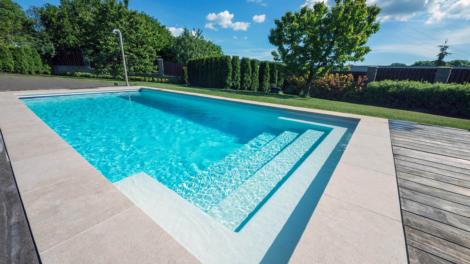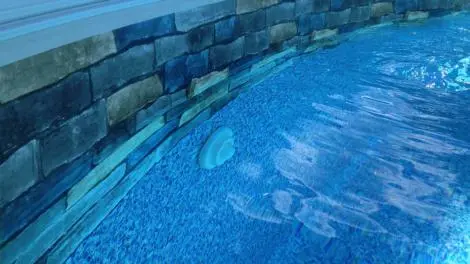You can choose different finishes when installing a custom pool in your house or renovating an existing pool.
Pool plaster is a good option if you want a classic look, and you can even get it dyed for further customisation. However, one of the most popular options is using an aggregate finish.
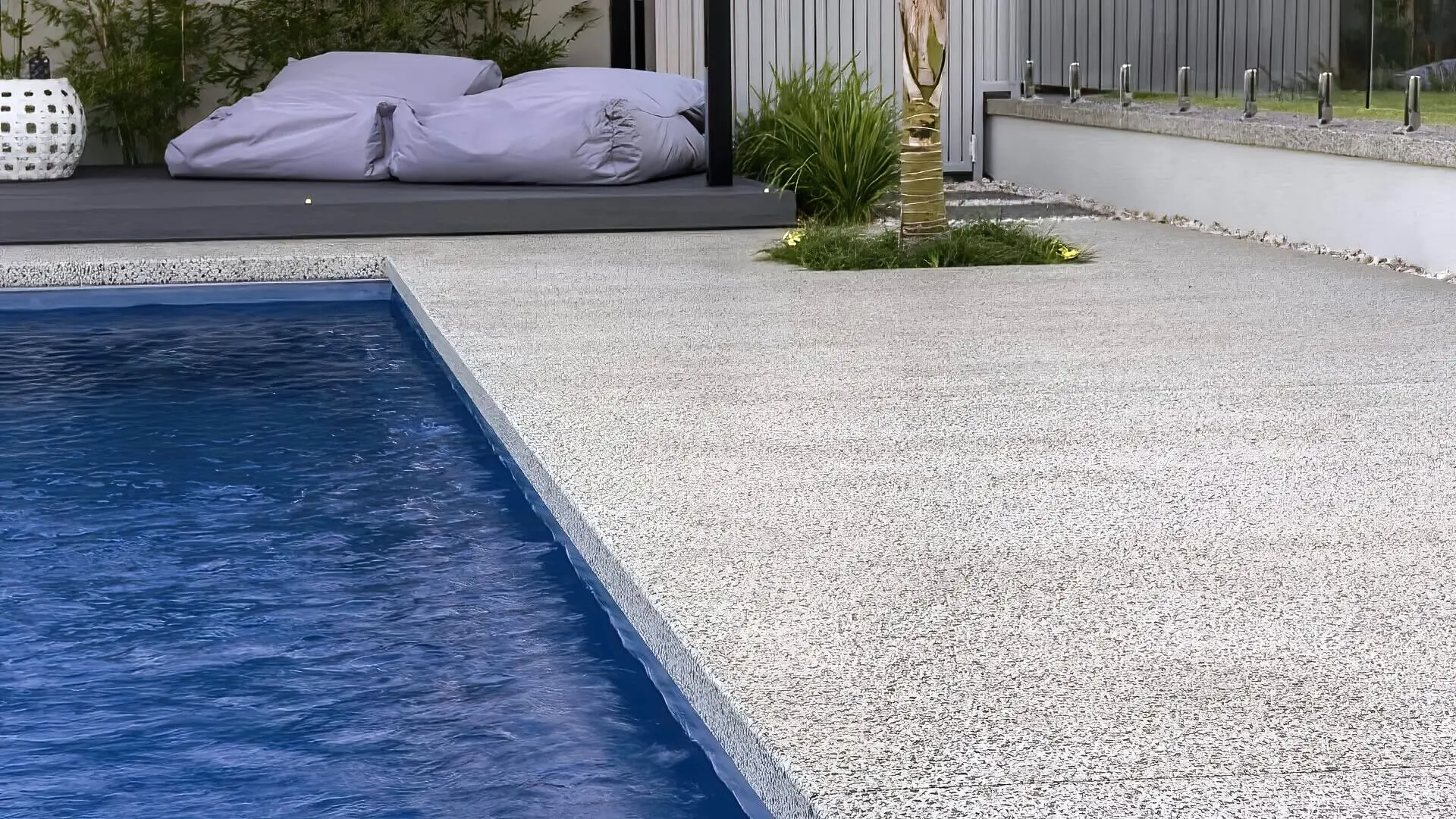
We have created this excellent guide for those unaware of the different types of pool finishes. We have also mentioned the different types of aggregates that you can select to customise your swimming pool.
So, without any further ado, let us get down to business.
What Is An Aggregate Pool Finish?
First, learn what an aggregate pool finish is and how it works. As the name implies, a swimming pool aggregate is a mixture of different materials, making it one of the most durable pool finishes available. These materials are generally composed of ground and sanded river pebbles combined with a concrete pool finish.
The aggregate is prepared by crushing and mixing these pebbles. This finish offers the next level of customisation after the traditional pool plaster finish, making it a popular choice among pool owners looking for durable pool finishes. Besides river pebbles, an aggregate finish can comprise ceramic-coated crystals, glass, stones, etc., providing various options to create unique and long-lasting pool surfaces.
Aggregate finishes are known for their durability and resistance to wear and tear, making them some of the most durable pool finishes on the market. With proper maintenance and care, an aggregate pool finish can last many years, providing a beautiful and functional surface for your swimming pool.
Types Of Aggregate Pool Finishes
There are several different types of aggregate finishes that you can go for. These include the Quartz Aggregate, which can add colour to your pool. It also provides your pool with lustre and smoothness.
Another excellent option would be to go for granite and marble aggregates. These natural stones can also be ground up for a plaster finish. However, these options are costlier than Quartz Aggregate.
The third option is the Pebble Aggregate, which includes accent stones, dyes, cement, and other materials. This type of aggregate is ideal for providing a natural look to your swimming pool. There are many colour options for you to select, and you also get a non-slip, textured surface.
Yet another popular option is a Seashell Aggregate. Seashells are generally included in pebble aggregates and provide a sparkling and smooth surface for your pool.
Other types of aggregate finishes offer different kinds of textures and appearances. Their various constituents cause variation in pool aggregates.
Advantages Of Using Pool Aggregates
There are several benefits of using an aggregate finish for your pool. The thing to understand is that different types of aggregate offer different benefits for your pool. Here are some of the advantages that pool aggregate finishes offer:
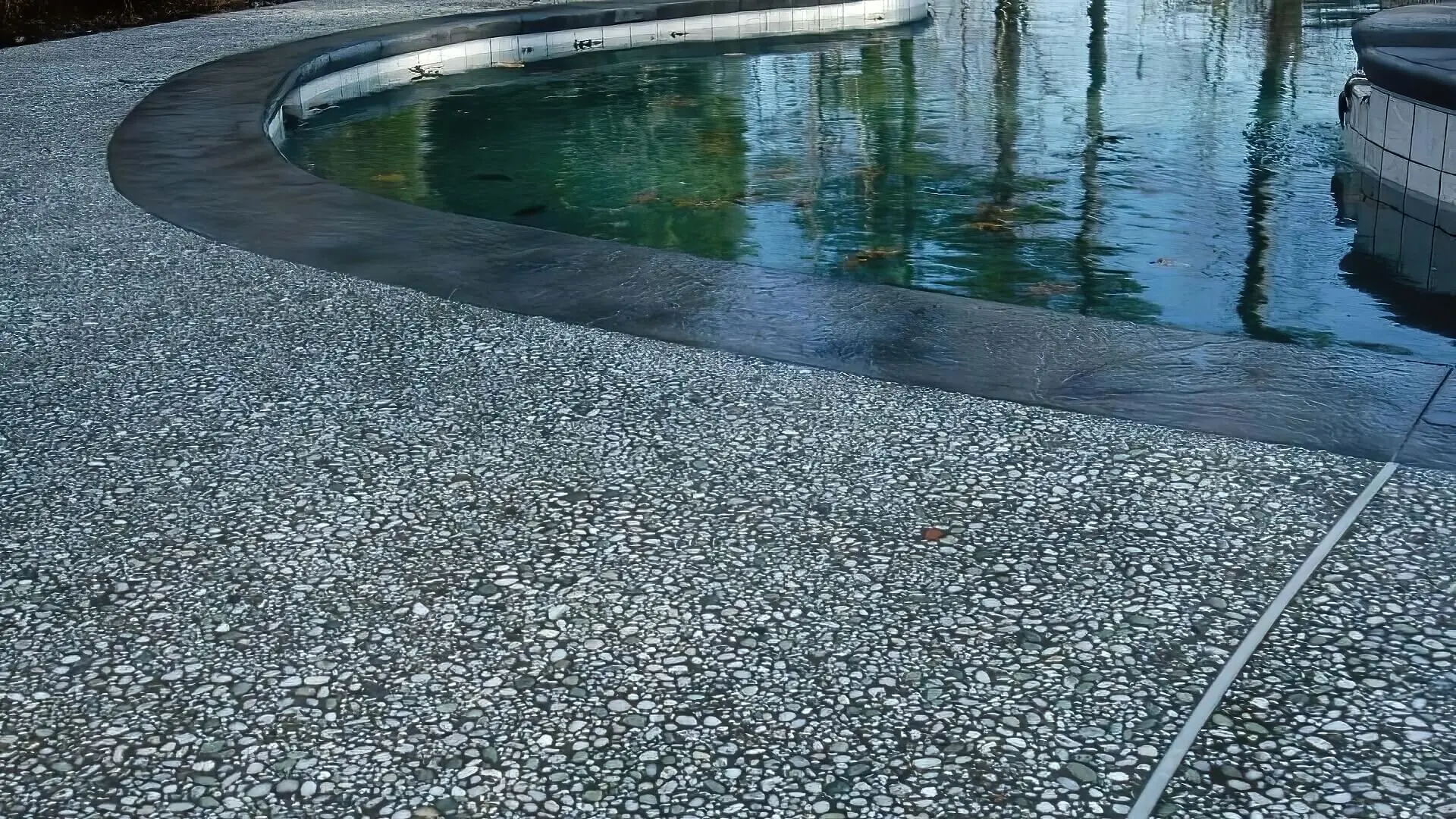
1. Provide Durability
Most types of aggregate finish contain varying amounts of stone and other materials. It provides strength and durability to the finish, ensuring it lasts long. They also become more resistant to chemicals and staining used to clean the surface.
Aggregate finishes are also more resistant to algae growth, a common problem with other types of finishes. While an aggregate finish is costlier than a plaster one, it provides a much tougher, heavy-duty surface and can withstand more weight.
2. Increased Lifespan
An aggregate pool finish can also help increase the lifespan of your pool. Chemicals and pool water can degrade the finish of your pool. Since aggregates contain many different materials, the chemicals and water react differently.
An aggregate can also withstand the effect of the elements better. How long the finish lasts depends upon its constituent materials. Pebble aggregates can last up to twenty years, while quartz aggregates have a lifespan of around twelve years.
3. Wider Customisability
Due to the numerous constituent materials that go into an aggregate finish, you get several choices for changing the look of your pool. There is no end to the possibilities regarding the design of your pool.
An aggregate pool finish helps you improve and customise the aesthetics of your pool. You can get different colours, textures, shapes, lighting designs and effects. It is one of the primary reasons why this type of finish has become so popular recently.
4. Convenient
Unlike a plaster finish, an aggregate pool finish appears to be very rough due to the different materials, such as pebbles, stones, shells, etc. However, despite the rugged appearance, an aggregate pool finish is much more comfortable underfoot and provides a non-slip surface.
According to research, the exposed aggregate finish is one of Australia’s most popular slip-resistant materials. Even local authorities and governments use this material for swimming pools.
Safety should be your biggest priority when designing a pool. An aggregate finish also provides a better grip and more excellent traction to the pool’s surface, and you can even get custom-blended textures quickly.
5. Requires Lesser Maintenance
A plaster aggregate is highly susceptible to algae growth and must be acid-washed completely once every three to five years. This process requires both time and effort, not to mention the cost.
The texture of the finish makes it relatively clean, as it is difficult for dirt to enter through gaps. Also, when it does get dirty, the aggregate is easy to clean using a pressure washer or just water with pressure, as the dirt only remains on the surface. The aggregate does an excellent job of hiding colour variations that occur over time.
Plaster also tends to crack quickly, requiring more excellent care and frequent repairs. On the other hand, an aggregate finish is easier to maintain as it does not crack and stain. It does not require acid-washing since algae cannot multiply on the surface.
6. More Economical In The Long Run
While getting an aggregate finish for your pool is initially more expensive than the traditional plaster finish, it helps you save more in the long run. It will help reduce the overall cost of the pool in the future, as you will not need to spend money on frequent repairs and maintenance.
Another way to reduce costs is to select the maximum allowable aggregate size. Using a larger coarse aggregate lowers the price of the finish by reducing the cement requirements. Lesser cement also requires more secondary water for a constant ratio, reducing the chances of cracking due to shrinkage.
Similarly, a pool with an aggregate finish does not require cleaning as frequently as a plaster finish. Modern-day cleaning procedures, such as an acid wash, are also quite costly. With an aggregate finish, you also get to save on such expenses.
Points To Keep In Mind
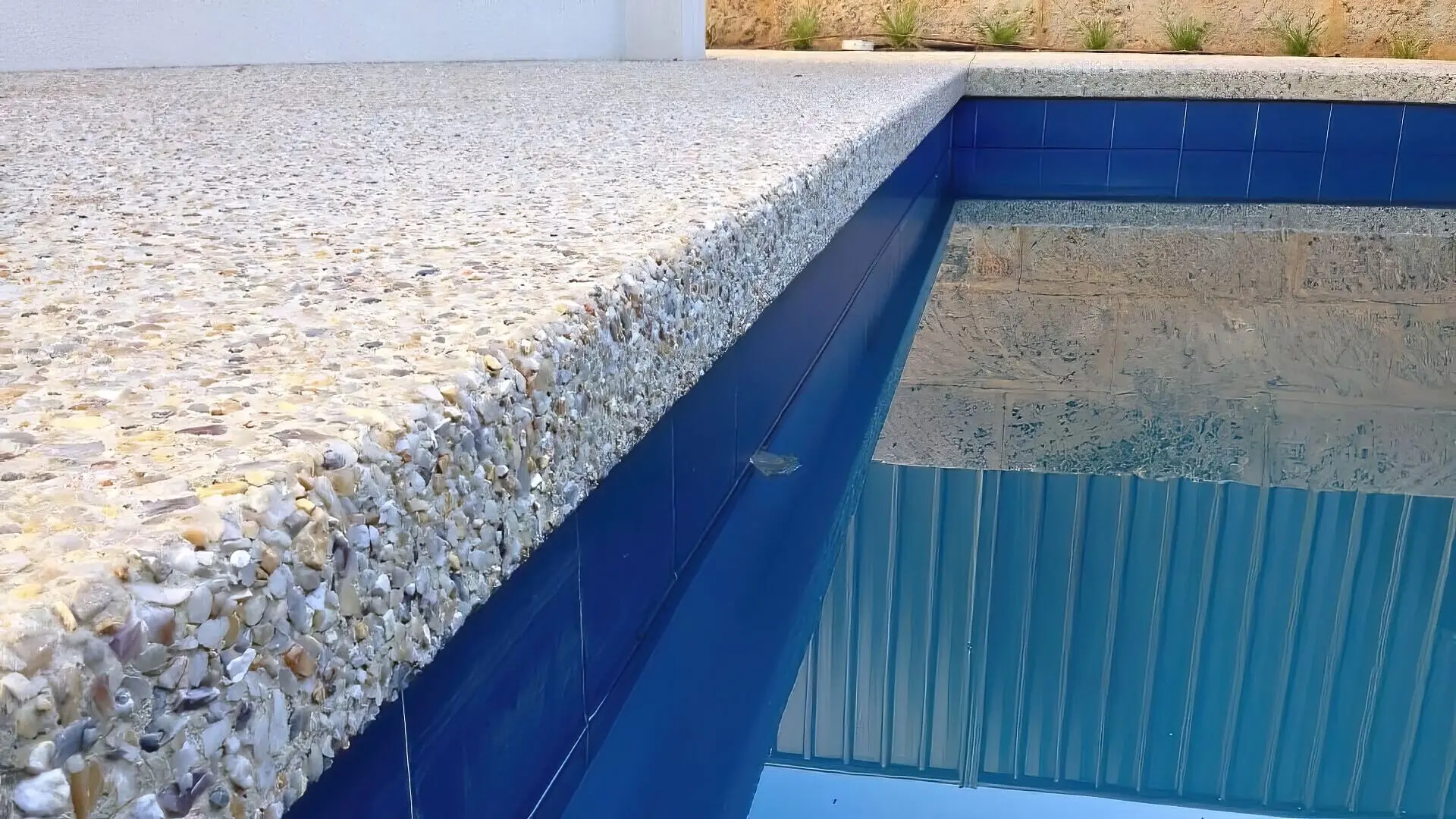
When choosing an aggregate finish for your pool, consider these points to ensure the desired results and longevity, contributing to the overall success of your pool project and pool design:
- A polished aggregate finish can be the longest-lasting pool surface if maintained properly, needing to be refined and resurfaced every 15-20 years.
- Use a water softener to prevent calcium build-up in the aggregate, including materials like river stones or glass, offering virtually endless combinations.
- The aggregate cost depends on the pool size and the materials used.
- Proper installation and water management are more important than the type of finish chosen.
- Colour variations in the aggregate can occur due to the sun, chlorine, water flow, and other factors influencing the water’s reflective properties on the pool’s waterline.
- Water pH and CSI also impact the life of the aggregate. Keeping the CSI between -0.3 and 0 is ideal for extending the life and retaining the appearance.
- The aggregate should also be power washed periodically to remove dirt and debris like a plaster pool.
- These crucial points will help you utilise your aggregate pool finish, ensuring a beautiful and long-lasting result for your pool project.
An Aggregate Finish For Your Pool
With the help of this guide, we hope you now know about the benefits of using an aggregate for your pool finish. From the high level of customizability to the low maintenance requirements, there are several reasons why you should choose aggregate for your pool finish.
Aggregate finishes offer exciting opportunities with many options for pool enthusiasts looking to install a new pool or renovate an old one. Put a unique spin on your pool with this finish.
So, get your pool installed or renovated with the aggregate finish of your choice for a great experience. Till next time!
